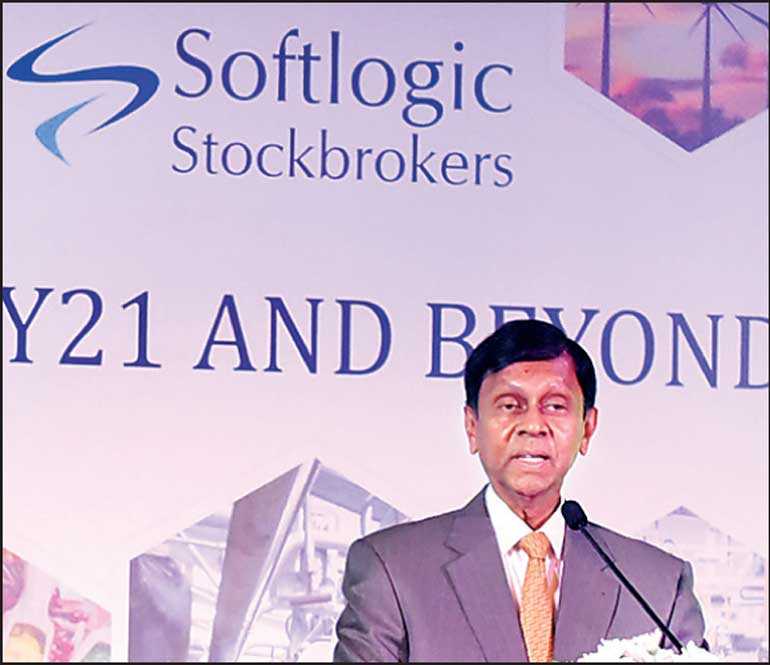Tuesday Feb 24, 2026
Tuesday Feb 24, 2026
Wednesday, 16 September 2020 00:00 - - {{hitsCtrl.values.hits}}

State Minister of Money and Capital Market and State Enterprise Reforms Ajith Nivard Cabraal
State Minister of Money and Capital Market and State Enterprise Reforms Ajith Nivard Cabraal yesterday nudged local investors and business community to have faith in a turnaround of the economy and Sri Lanka’s fortunes, as the new Government has already set in motion, and will implement in the future, favourable measures and policies.
“We are confident of high growth in the next five years, despite the challenges. We have and will put the necessary build- ing blocks for a conducive envi- ronment and policy regime. Sri Lanka will come out stronger with more resilience, and an exu- berant private sector that can withstand shocks,” Cabraal told an investor forum titled “Twenty 21 and Beyond” organised by Softlogic Stockbrokers yesterday.
Having detailed a host of measures that the new Government has put in place and is planning, as well as the uptick in investor and business sentiments since the General Election, Cabraal said: “Every dark cloud has a silver lining, and the resilient business community will be more resilient.”
Cabraal said that some continue to doubt whether the new Government can pull Sri Lanka out of the mess that the previous regime left behind, adding, “We have assured we can and we will.”
Providing context, he said that between 2015 and 2019, the country suffered stagnant growth, rising unemployment, a dwindling rupee, low reserves with the export sector struggling, and market capitalisation halving from $ 25 billion to $ 12.5 billion. “This wasn’t an aberration, but real, and everyone felt it,” he added.
“These achievements are things which we couldn’t be proud of, but the resilience of the private sector, which is a hallmark, ensured Sri Lanka survived,” Cabraal added.
He said the previous Government Budget showed a Rs. 2.2 trillion Government revenue, but in reality the actual collection was Rs. 1.8 trillion, reflecting a Rs. 400 billion short fall. “This was due to the downfall of the economy, and everyone felt it,” he opined.
Cabraal said that following the election of Gotabaya Rajapaksa as the President in November 2019, the new administration set its sights on key priorities, including stabilising the rupee (which fell from Rs. 131 to the dollar to Rs. 185 between 2015 and 2019), reducing interest rates and taxes etc. This was critical, though Sri Lanka and the rest of the world was impacted by the COVID-19 pandemic in early 2020.
He said that post-COVID-19, the Government had to take difficult steps and make a call whether to default on its sovereign debt, versus curbing forex-guzzling jobs and lifestyle-impacting imports. “We opted for the latter, because we wanted to send a positive message to the rest of the world that we are a responsible Government, and wouldn’t want to default on our debt obligations,” Cabraal said.
However he assured that once the economy returns to normalcy or near normal, imports will be restored.
Post-COVID-19, Cabraal said exports have bounced back to near-normal, remittances were back on track, and a lower oil bill was compensating for zero earnings from tourism. “I will say the external account today is not as bleak as it looked during COVID-19,” Cabraal said.
“We have put and are putting in place the building blocks for high growth, despite challenges. We want the private sector to brace itself for a take-off, rather than losing hope, because there are plenty of positives of late,” he added.
Focusing on the stock market, Cabraal said the CSE has bounced back, encouraged by the positives and future upside. “The CSE has so much value as stocks are grossly under-priced,” he said. Acknowledging that it is true that foreign investors have sold out to the tune of over Rs. 30 billion, Sri Lankans have reinforced confidence by buying foreign holdings, and he emphasised that it reflected the actual depth of the local investor base.
“It is fine that Sri Lankans are buying in at a bargain, and foreign investors will eventually return and the sellers will be Sri Lankans who bought earlier,” Cabraal said.
He told capital market players that if it can succeed in securing 1% of Rs. 10 trillion deposit base of banks and finance companies, the CSE will benefit by Rs. 100 billion in captive funds. “This is the true potential of the CSE, and stakeholders must harness it,” he said. Cabraal also recalled that even in its best effort, State funds such as the EPF invested only Rs. 70 billion.
